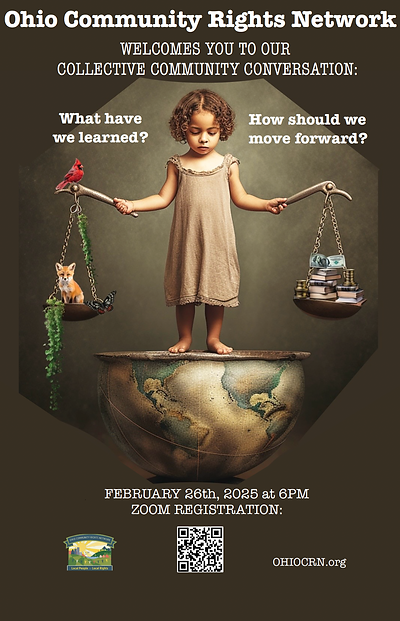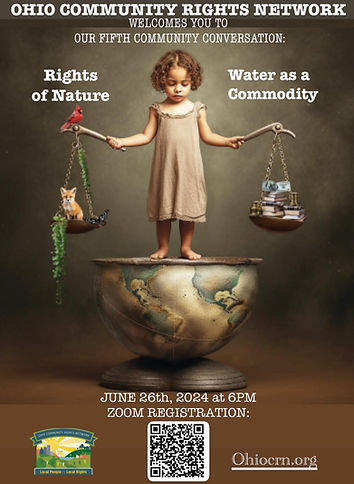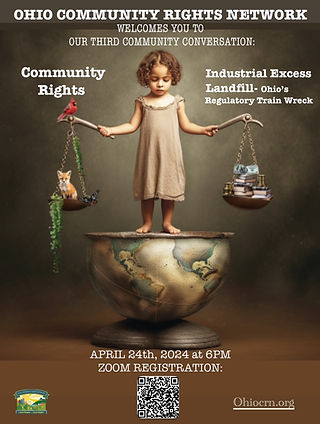
Community Conversations with the
Ohio Community Rights Network
4th Wednesdays of the month, 6:00 pm
Live and on Zoom
Continuing Community Conversations: Bioregioning
On April 23, 2025, we hosted a discussion on Bioregioning.
Cindy Lanese from Columbus and Bill Cahalan from Cincinnati spoke on their groups' efforts concerning bioregioning. Great conversation resulted.
For more on this topic, this video is a good introduction.
Bioregioning 101 | Reality Roundtable #14
Points to ponder:
What is included in a bioregion?
How would you define your bioregion?
What differences and similarities do you recognize between bioregions?
How can the topic of bioregionalism be incorporated into helping communities become more resistant and resilient?
Resources:
Cascadia: Department of Bioregion
Crow Ohio
Daniel Christian Wahl
Reconnecting to Place for Planetary Health
Design School for Regenerating Earth
The Design Pathway for Regenerating Earth Joe Brewer
Charles Eisenstein- "Climate"
Great Lake Erie Southern Shore bioregion
Ozark Area Community Congress
Planet Drum Foundation
Reeds and Roots Skillshare (NE Ohio Earthskills Gatherings)
Collective Community Conversation
Click HERE for the Video Recording of the Collective Community Conversation.
To read summaries of the previous six conversations click HERE.
On Wednesday, February 26, 2025, the Ohio Community Rights Network hosted a "Collective Community Conversation: What Have We Learned? How Should We Move Forward?"
We held discussions in 2 sessions of 4 breakout rooms centering around the questions below and generated lively and important conversation. We came back together as a whole and gave summaries of the small group discussions. We discussed issues in individual communities and also how to move forward in continuing these conversations, keeping connected and taking positive actions in our communities.
Through discussions over the last several weeks, we had compiled the following questions to foster conversation during this collective conversation. Here are a few of those questions:
Reactions to Previous Conversations:
1. If you attended more than one community conversation, did you notice any common themes, common community reactions or common conclusions? If so, what did you observe?
2. Was there anything surprising that you learned? Please share.
3. What are some of the obstacles preventing us from creating the communities we envision?
4. Do you think we can change the current system through the electoral process?
Thoughts on Participant's Community:
5. What issues of concern or positive progress are you aware of and/or dealing with in your
community?
6. If you could plan the best conditions for your community, what would they be? What do you
wish for?
7. What ideas do you have to make your community more resilient and move toward what you
envision for your community?
8. Do you believe local communities - municipalities, townships, and villages - should have
self-governing rights? Why or why not?
9. What are some values you think most of your community could agree on?
Our 6th Conversation
"What is the Nature of Community?
What is the Community of Nature?"
On Wednesday, January 22, 2025, the Ohio Community Rights Network, hosted a conversation entitled "What is the Nature of Community? What is the Community of Nature?" with Susan VonderHaar and Jim Schenk of Cincinnati about permaculture, an urban eco-village and how to begin creating intentional community.
Susan is the Director of the Cincinnati Permaculture Institute and discussed the practice of Permaculture and how the ethics and principles of the natural world should inform how we create human built systems.
Jim is author of "Creating an Urban Ecovillage; a Model for Revitalizing our Cities". He talked about the Enright Ridge Urban Ecovillage that he has been involved with for decades and shared the interconnectedness of Ecology and Community in their EcoVillage experience.
To watch the conversation, click HERE or click the image.
Before the conversation we shared 2 videos and had some "Points to Ponder"
Introduction to Social Permaculture - with Lila Rimalovski. Video is 37 min, view from 18-27 min
Interviews from Los Angeles Ecovillage- with Louis Arken. Video is 48 min, view from 2:55-9:30 min
Points to Ponder:
1) What makes up a community?
2) Why is a healthy community essential?
3) What are some needs a community fills?
4) How can we better recognize and appreciate the non-human as part of our community?
5) If you were able to create an intentional community, what would it look like?
6) How would the rights of Nature affect/improve the concept of ecovillages?
Susan says the concept of ecovillages brings us closer, as a model, to respecting the rights of nature.
What things do you wish could happen to further the ecovillage model?
Our system makes “sustainability” illegal. What “illegal” activities could further the sustainability of a community?
Resources for further investigation:
Cincinnati Permaculture Institute. https://cincinnatipermacultureinstitute.org/
Community Earth Alliance. https://communityearthalliance.org/
CROW
https://www.facebook.com/CROWOhio/
https://crowohio.org/about/
Susan Vonderhaar's Permaculture Slide Show
Jim Schenk's Eco-Village and Rights of Nature Slide Show
Our 5th Conversation
"Rights of Nature vs. Water as a Commodity"
On Wednesday, June 26, we hosted "Rights of Nature vs. Water as a Commodity", a conversation with Sherry Fleming. Sherry is a member of the OHCRN’s board and a founding member of their local citizen group, the Williams County Alliance. Williams County is located in the far northwest corner of Ohio and is totally dependent upon the Michindoh aquifer for water.
In July 2021, AquaBounty, a land-based aquaculture corporation, announced plans to build an 11-acre indoor facility in Williams County that would be one of the largest in the world, where it would hatch, raise, process, and sell genetically engineered salmon. This facility would withdraw over 5 million gallons of water every day and dump almost the same amount every day into the St. Joseph River – a river which lies in the watershed of the western basin of Lake Erie.
To watch the conversation click HERE or click the image.
Water is life, yet lakes and streams are polluted and aquifers are being depleted and contaminated. What does that say about how we as a culture value water? How often do we think about or even know where the water we use comes from, let alone understand how water is treated under existing law. If existing law is failing to protect the water, can we learn from cultures that have a different relationship with water?
A resident from a rural county in northwest Ohio will share their community’s story of facing the commodification of the Michindoh aquifer, their only source of water, and how that might impact the Great Lakes ecosystem.
Join this community conversation to explore our relationship to water.

In order to prepare for a rich discussion, we shared a video, an article and points to ponder:
View this short video:
Why lakes and rivers should have the same rights as humans | Kelsey Leonard,
Read the article:
Nature Needs a New Pronoun: To Stop the Age of Extinction, Let’s Start by Ditching “It”, by Robin Wall Kimmerer
Points to Ponder:
1. In 2019, Ohio implemented legislation which gave the Ohio Department of Natural Resources sole authority over groundwater, basically equating groundwater with other natural and mineral resources in the state.
Should water be designated as a resource under law? Why or why not?
2. The regulatory system does NOT recognize the impact upon non-human entities in the ecosystem when issuing a permit to withdraw groundwater. How do you think that affects our relationship with water and other non-human entities?
3. How we relate to nature plays a role in how we treat water. In western culture, what is our relationship to the non-human world, such as water. Is water alive? Are we part of nature or separate from nature?
4. How might recognizing an ecosystem’s right to exist, flourish and evolve, give the water more protection than existing law?
5. In the article by Robin Wall Kimmerer, she shares that in Indigenous culture, non-human beings are referred to in the same manner as family. Western culture objectifies non-human things as “it”. Do you think language could help shift perspectives about nature? If so, how might that shift in the use of language to refer to the natural world happen?
Our 4th Conversation
A Truth and Reckoning with Nature: Isn't it time Ohio?
On Wednesday, May 22, we hosted our 4th conversation entitled, "A Truth and Reckoning with Nature: Isn't it time Ohio?", with Tish O’Dell, OHCRN board member and Consulting Director for CELDF to imagine what being in right relationship with nature and each other might look like and how can we get there.
Click HERE or on the image to view the Zoom recording of the Conversation.
Points to Ponder:
When an industry announces plans to come into a community, residents may discover that there is more to the story than the “more jobs and money” mantra. Instead, what they learn often raises concerns and many times actual fear and panic. Elected officials will attempt to quiet the alarm by stating that we have “strict regulations” to protect the community and nature. But is that really the case? Does the existing system of law recognize the important relationship between healthy ecosystems and healthy communities or does it place more importance upon the needs of an industry to profit from exploiting nature and the community and future generations.
Is it time to consider whether we continue to participate in a rigged system which too often places communities and nature in an abusive relationship with industry – or do we begin to be honest with ourselves - and with each other - and admit this is bullshit.
It is a tough pill to swallow, but if we are going to change the system and attempt to create something new, we have to free ourselves to think creatively and imagine a healthy, just and sustainable community as the first steps to making them real.
In order to prepare for a rich discussion, we shared the following:
Viewed this video: Reckoning with the Truth to Get in Right Relationship with the Great Lakes https://youtu.be/x0CO-05VvxY?si=r9D1TuY7LPANDi4s,
Read this article ‘Truth, Reckoning and Right Relationship’: A Rights of Nature Epiphany,
And considered the following questions.
1. What is your relationship with a body of water in your community/ecosystem? Would you say you are in a right relationship?

2. Our current cultural and societal norms, which are reflected in both our laws and policies, separate humans from the natural world (nature). Can you think of examples of this?
3. What changes would need to happen (culturally, legally, and economically) to meaningfully protect the ecosystem your community is part of and to allow them to flourish and thrive? What impact do you think that would have on the residents of the community now and in the future?
4. Our current environmental laws and policies regulate instead of prohibit harms to nature. This regulatory model permits and legalizes “regulated amounts” of toxins, poisons and destruction of nature, while causing us to believe that we are somehow being protected from harm because of these laws and policies. We seem to notice or pay attention when a spill or explosion or other disaster happens. We seem to have a reactionary approach to protecting nature instead of a precautionary one. Can you give examples of this in other areas of our society besides the environment?
5. Are we nature?
Resources for further investigation:
CELDF Website www.celdf.org
Truth, Reckoning and Right Relationship (TRRR) entire playlist
https://youtube.com/playlist?list=PLes1m5r1R-ZFZKeshvIl9941zxzbE6TxV&si=fVq1Q_6HaEZqrT64
TRRR Highlight video https://youtu.be/x0CO-05VvxY?si=2ItAaIbirg5lVZ7N
Trailer to Documentary “What we Do to Nature We do to Ourselves” https://youtu.be/Vs6gMo3-u58?si=RgwKYBIlfTv0nKdQ
Peace Chronicle Am I an Activist? https://www.peacejusticestudies.org/wp-content/uploads/2024/03/5.Testimony-of-a-Community-Organizer-%E2%80%93-Am-I-an-Activist-.pdf
Inside Climate News Articles
https://insideclimatenews.org/news/04022024/cleveland-museum-rights-of-nature/
https://insideclimatenews.org/news/28042024/earth-day-rights-of-nature-cleveland/
Our 3rd Conversation
Our THIRD Community Conversation on Industrial Excess Landfill (IEL) - Ohio’s Regulatory Train Wreck was on Wednesday, APRIL 24, with participants from around the state (on Zoom) and featuring activists who have worked for over 40 years to get the Industrial Excess Landfill cleaned up. The discussion was heartbreaking and inspiring as we heard from activists who will not be silenced!
Click HERE or on the image to view video of the Conversation.
In order to prepare for a rich discussion, we watched this short 6-minute video Uniontown, Ohio Landfill News Clip #24 and consider the following questions.
1. Is a former 30 acre sand and gravel pit, unlined, on a hill, near the center of town, with 3000 residents living within a 1 mile radius (mostly dependent upon well water) a proper location for an industrial landfill? Where is a good location for an industrial landfill?
2. How long do you let residents ingest contaminated groundwater before testing, then inform them that they MUST abandon their private wells (under the threat of civil penalties and fines) to hook up to a provided public water supply?
3. The remedy provided by the combined professional expertise and resources of the USEPA, Ohio EPA, Ohio Department of Health, Agency for Toxic Substances and Disease Registry (ATSDR), multinational Potentially Responsible Parties, US Army, National Analytical Radiation Environmental Laboratory (NAREL) and others was to simply cover the IEL site with a 4” thick semi-permeable cap and surround it by a chain-link fence. How protected would you feel living next to that?
4. Do court settlements with imposed gag-orders supersede the public’s right to know when life, health, safety and welfare are at stake? Worded differently, does money supersede humanity?
Pertinent Links from the discussion:
"EIL" UnionTownOHLandfill YouTube Channel. https://www.youtube.com/@UniontownOhLandfill
Integrity Out Loud Podcast: Inside the Decades-Long Fight Over an Ohio Superfund Site (24:38)
https://www.podbean.com/media/share/pb-5n79c-10bc948?utm_campaign=w_share_ep&utm_medium=dlink&utm_source=w_share
Four Part Series by Investigative reporter Greg M. Schwartz
Our 2nd Conversation
Our SECOND Community Conversation on The Regulatory Fallacy was Wednesday, March 27, with participants from around the state (on Zoom) and featuring the Youngstown community. It was a lively discussion! Click HERE or on the image to view video of the Conversation.
For this discussion, we viewed this short 4-minute video on the Regulatory Fallacy and discussed the following questions (shared beforehand).
1. Have you or your community had any experience with a regulatory agency (Not limited to environmental agencies)? What was the process and the result?
2. What do permits actually do?
3. What are some problems with regulations and regulatory agencies? Are regulatory agencies really designed to protect us?
4. What are some reasons that make it difficult/impossible for people to create the sustainable communities they envision?
A few pertinent links from the conversation.
Our Book: "Death by Democracy" https://www.ohiocrn.org/community-stories
SOBE Concerned Citizens of Youngstown. https://www.stop-sobe.com/
The Box of Allowable activism
https://celdf.org/2015/08/is-it-really-illegal-to-think-outside-the-box/
Explore EPA's environmental justice screening and mapping tool
https://www.epa.gov/ejscreen
Our 1st Conversation
Our FIRST Community Conversation on State Preemption was Wednesday, February 28, with participants from around the state (on Zoom) and an in-person panel and participants from the Athens community. It was an informative and empowering discussion!
Click HERE or on the image to view video of the Conversation.
We viewed this short (less than 5 minute) video on Preemption and discussed the following questions.
1. What are the two main types of preemption and what is the difference?
2. What are some of the most recent examples of state preemption in Ohio?
3. Which type of preemption is mostly being used by state legislatures these days and what are the arguments used to justify them? Whose interests are being served by enacting them?
4. Have you had direct experience with a state or federal preemption law in your community? Does the principle of democracy conflict with state preemption?






